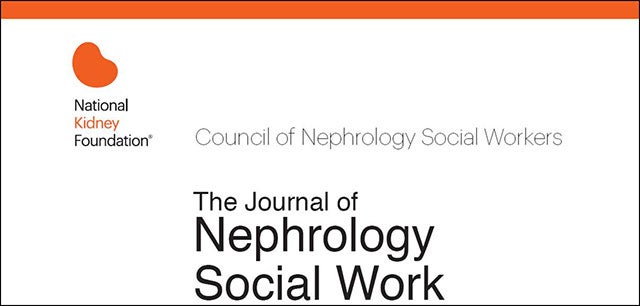
Table of Contents
STUDY
Relaxation Therapy and Mindfulness Meditation One-Day Workshop for Nephrology
Social Workers: Exploring the Impact of This Training on Professional Practice—PART TWO
Gary Petingola, MSW, RSW
Diabetes Care Service, Health Sciences North/Horizon Santé-Nord, Sudbury, Ontario, Canada
Relaxation therapy techniques and mindfulness meditation are clinical intervention tools that have demonstrated benefits associated with the reduction of negative psychological states and the enhancement of positive states of mind critical to the alleviation of physical and emotional distress (Jain et al., 2007). Many mind-body therapeutic training workshops are offered in a one-day format; however, there is a gap in the literature examining the direct impact of learning relaxation therapy and mindfulness meditation specific to nephrology social work practitioners, and how, if at all, learning these techniques might assist a practitioner in his/her work. A study was undertaken to examine the influence of a one-day educational workshop on relaxation therapy and mindfulness meditation on nephrology social workers' professional practice. Eight members of the Canadian Association of Nephrology Social Workers with limited previous exposure to mind-body therapeutic approaches participated in this project. Telephone and Skype participant interviews occurred following the workshop on three separate occasions over a period of four months. The key findings from this study suggest that (1) the workshop had an impact on professional practice, (2) the workshop had an impact on self-care, and (3) amid obstacles to implementation, nephrology social workers expressed their desire to expand their current scope of practice to include relaxation therapy and mindfulness meditation with their clients.
Download
RESEARCH
A Rationale for Increasing Physical Activity in Chronic Kidney Disease:
Quality Insights Renal Network 3's Learning and Action Network's Campaign
Joan Wickizer, MSW, LSW, NSW-C, Quality Insights Renal Network 3, Cranbury, NJ
Danielle Kirkman, PhD, Department of Kinesiology and Applied Physiology, University of Delaware, DE
Individuals diagnosed with chronic kidney disease (CKD) are often reluctant to engage in physical activity. Research has demonstrated myriad physical and psychological health benefits of regular exercise in this population. The challenge for many renal care providers has been translating these benefits for patients in a manner that engages them in the process. Quality Insights Renal Network 3 (QIRN3) worked with in-center hemodialysis providers to promote increased physical activity with patients within the network. These patients were provided with education about the benefits of increasing physical activity and were asked to sign pledge cards indicating their goals in this regard. The final results of this campaign showed 42.3% of patients in the targeted facilities signed pledge cards indicating their plans to increase their physical activity and well-being.
Download
REVIEW
Nephrology Social Workers' Caseloads and Hourly Wages in 2010 and 2014:
Findings from the National Kidney Foundation Council of Nephrology Social Work Professional Practice Survey
Joseph R. Merighi, PhD, MSW, LISW, University of Minnesota, Saint Paul, MN
Teri Browne, PhD, MSW, NSW-C, University of South Carolina, Columbia, SC
In 2010 and 2014, the National Kidney Foundation Council of Nephrology Social Workers (NKF-CNSW) conducted online surveys of nephrology social workers to assess caseload and salary trends at the state, national, and End-Stage Renal Disease Network level. Between 2010 and 2014, outpatient dialysis social workers experienced decreases in mean caseload size from 79 to 75 (down 5.1%) for those employed 20–31 hrs/wk, 121 to 113 (down 6.6%) for those employed 32–40 hrs/wk, and 126 to 116 (down 7.9%) for those employed 40 hrs/wk. Increases in mean hourly wage between 2010 and 2014 were also reported across all three employment status groups: $28.16 to $29.45 per hour (up 4.6%) for those working 20–31 hrs/wk, $27.18 to $28.23 per hour (up 3.9%) for those working 32–40 hrs/wk, and $26.93 to $28.21 per hour (up 4.8%) for social workers employed 40 hrs/wk. Pre-transplant evaluations of potential donors decreased between 2010 and 2014 for social workers who were employed full time (32–40 hrs/wk) and those who worked 40 hrs/wk. Specifically, the mean number of potential donor evaluations declined from 40.5 to 22.1 (down 45.4%) for those employed 32–40 hrs/wk and 44.7 to 23.0 (down 48.5%) for those employed 40 hrs/wk. However, pre-transplant evaluations of potential recipients decreased for those employed fulltime (522.5 to 283.7, down 45.7%) and increased for those employed 40 hrs/wk (232.6 to 315.6, up 35.7%). Mean hourly wage data showed a slight increase for transplant social workers employed full time ($29.56 to $30.74, up 4%) and a slight decrease for those employed 40 hrs/wk ($29.79 to $28.74, down 3.5%). In general, decreases in social work caseload and increases in hourly wages were found on a national level; however, variability across states requires further attention.
Download
Social Work Abstracts From the National Kidney Foundation 2015 Spring Clinical Meetings - March 25–29, 2015
Download